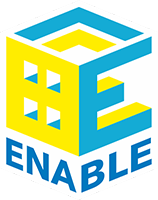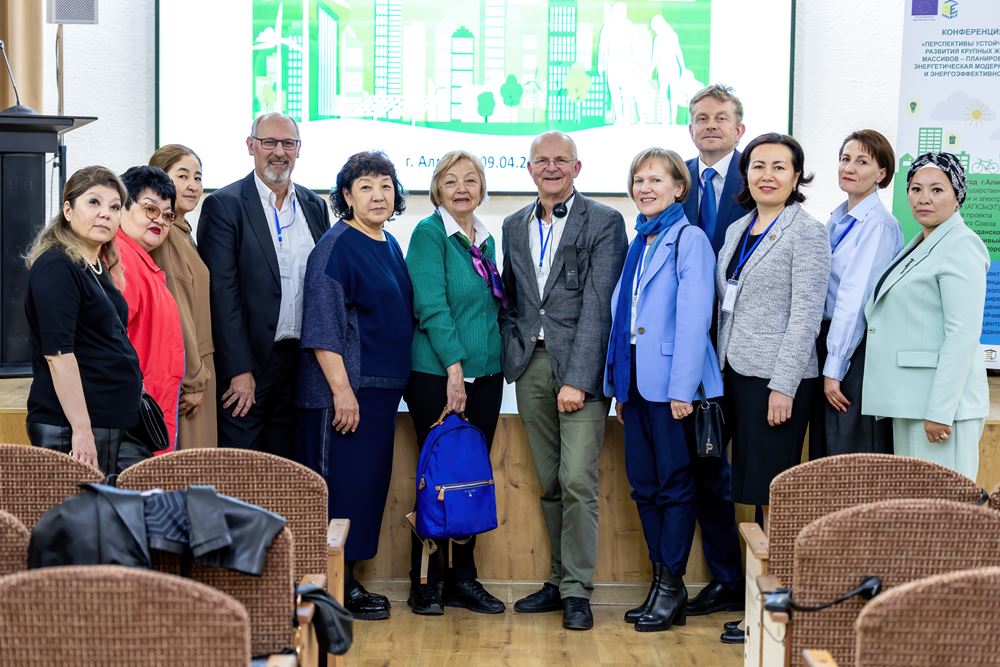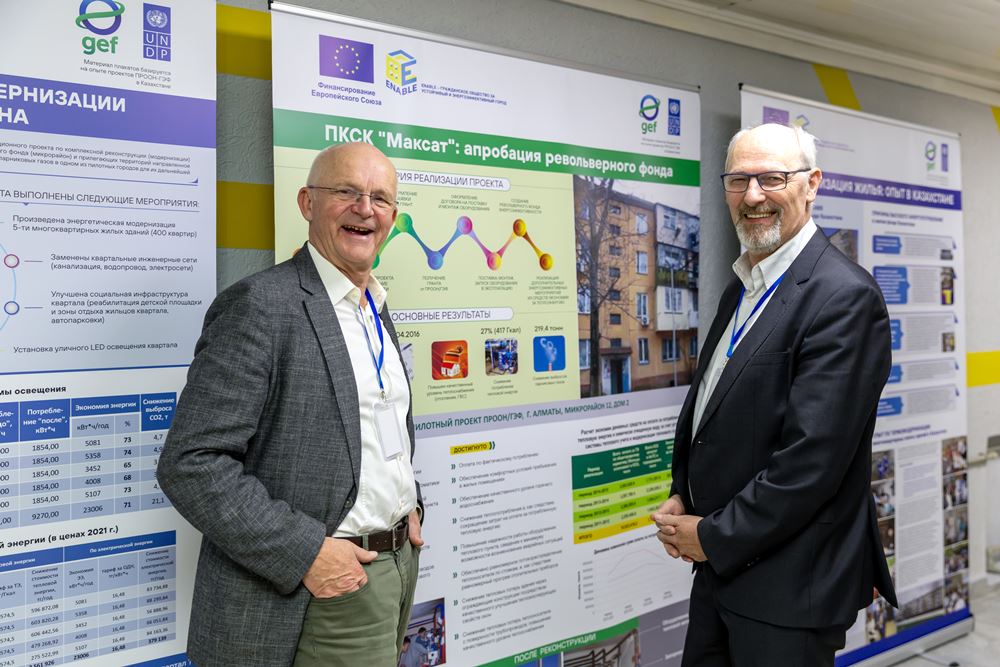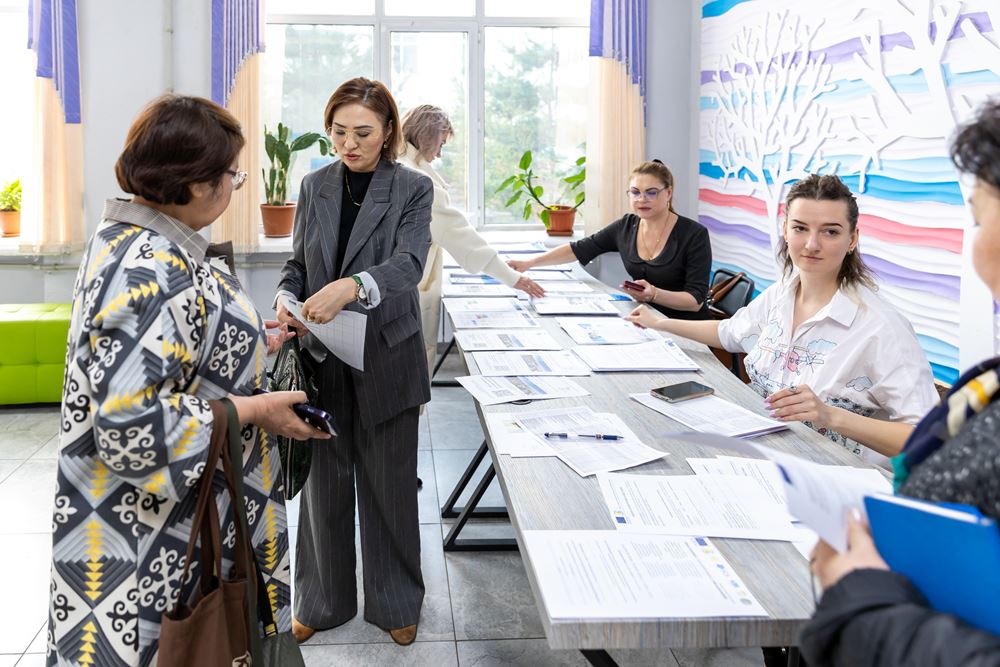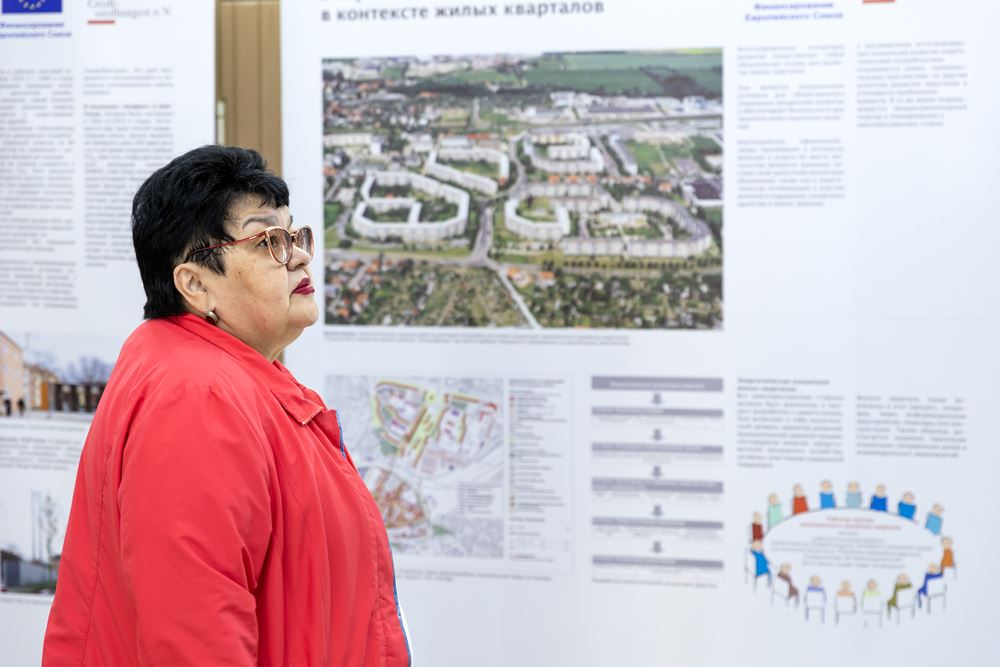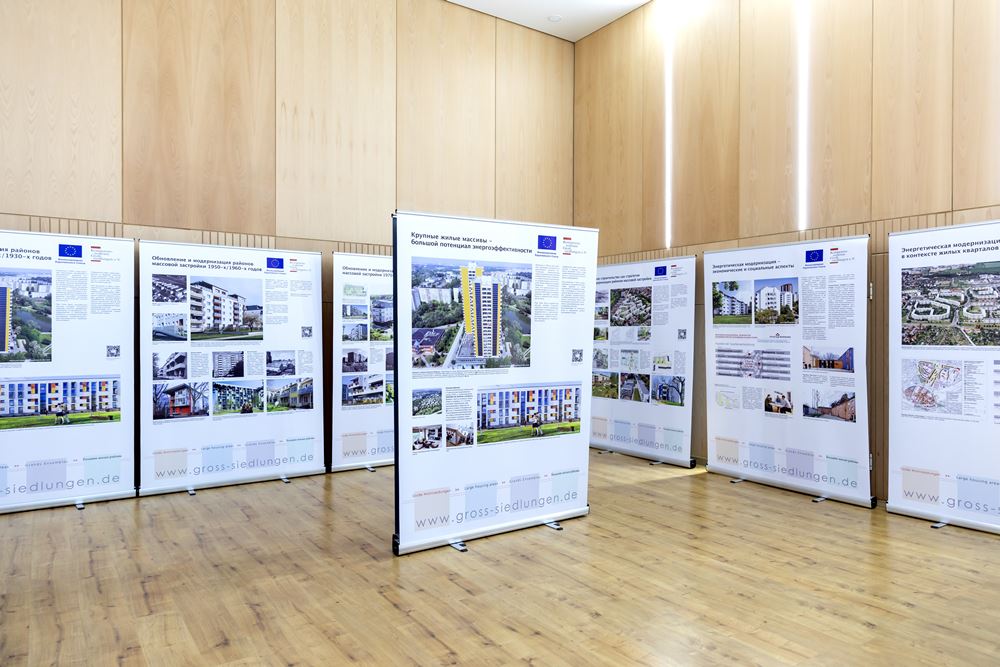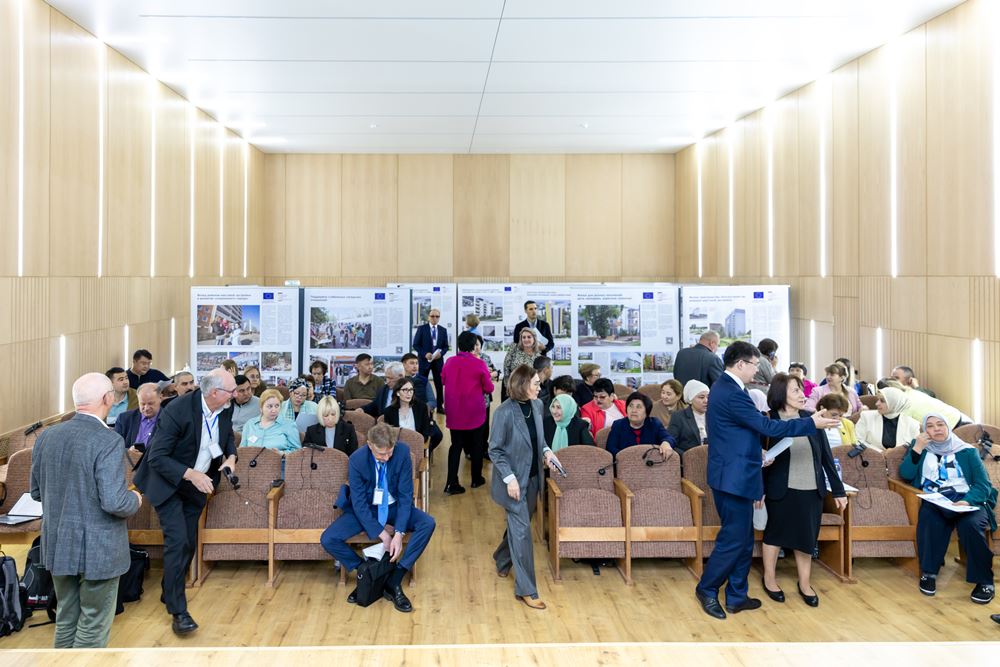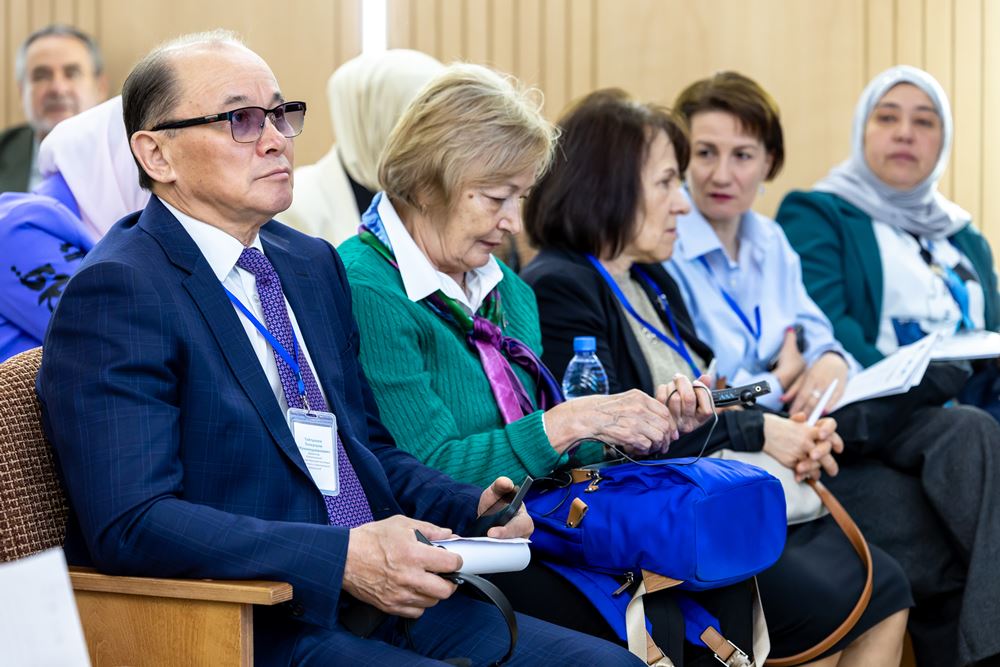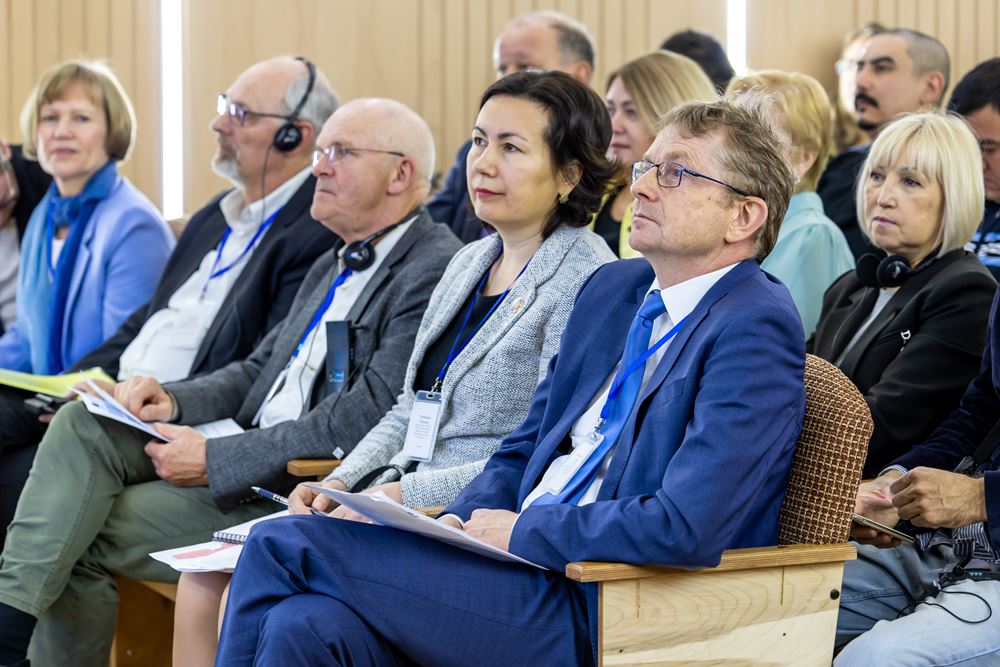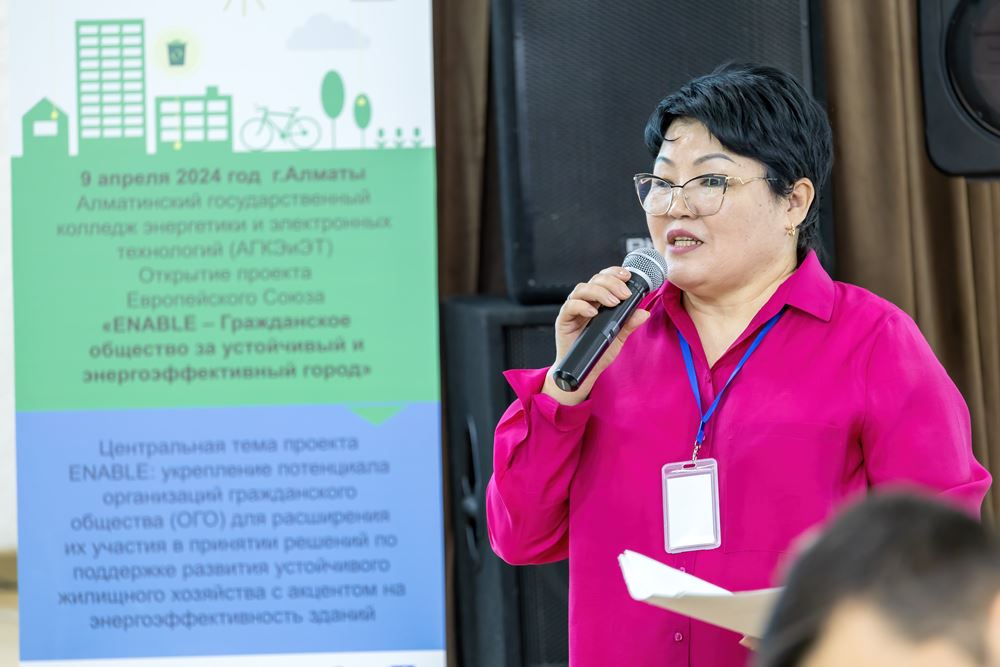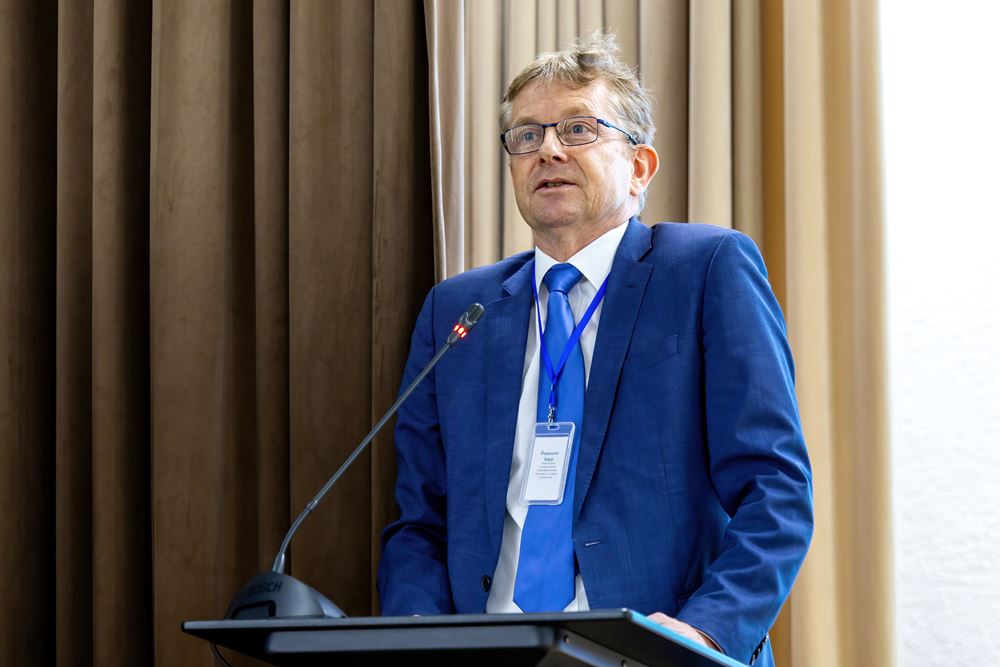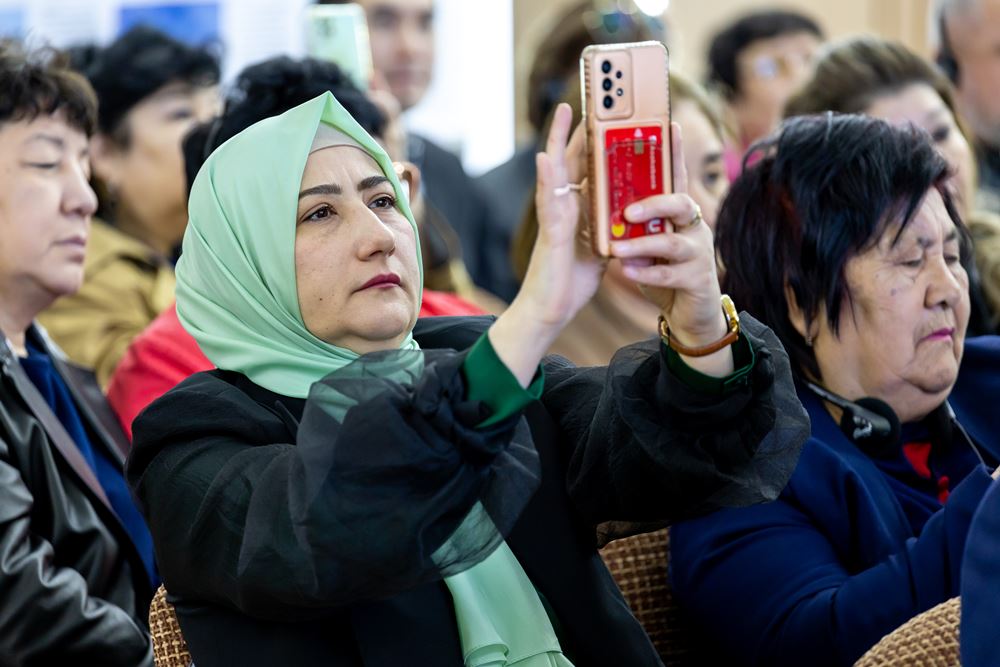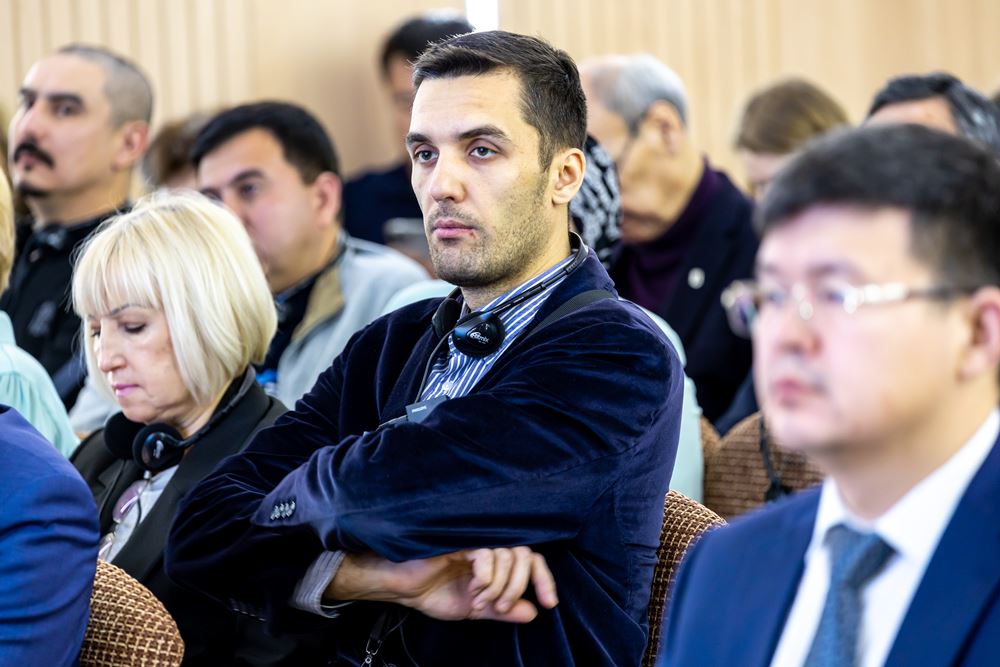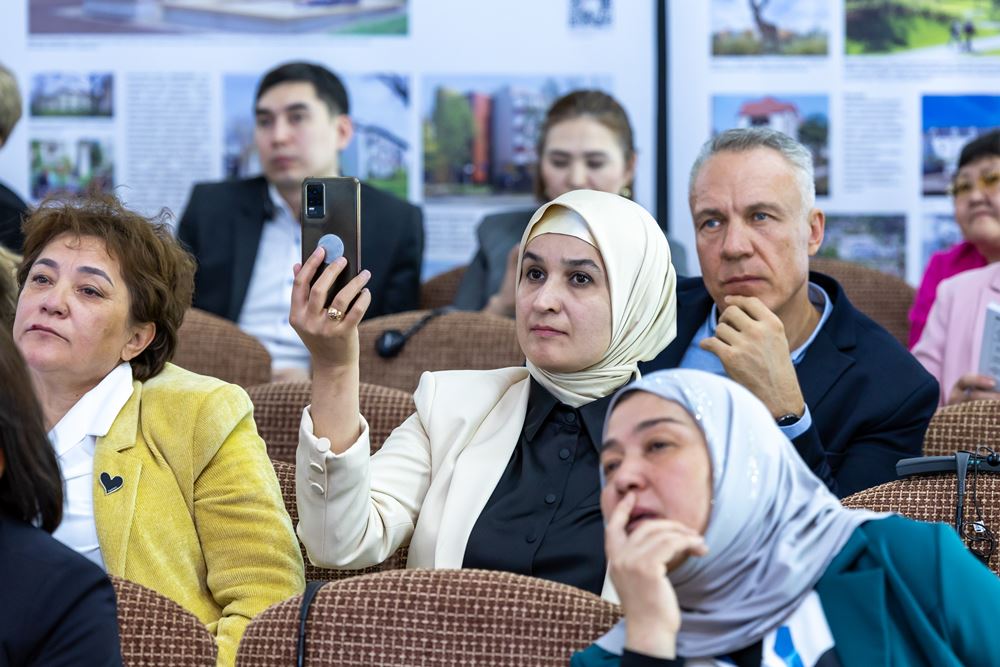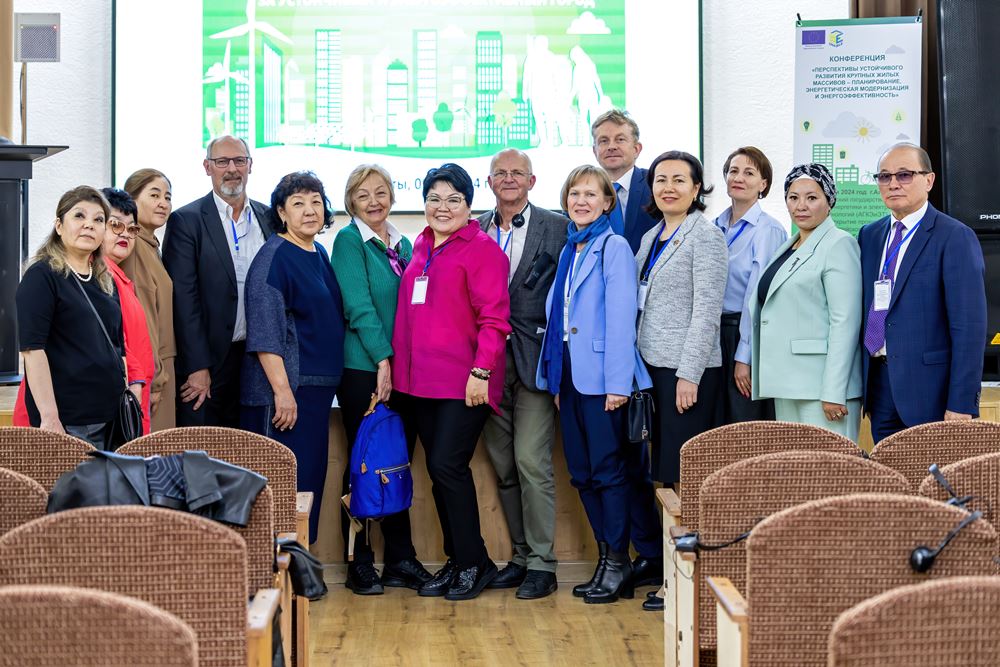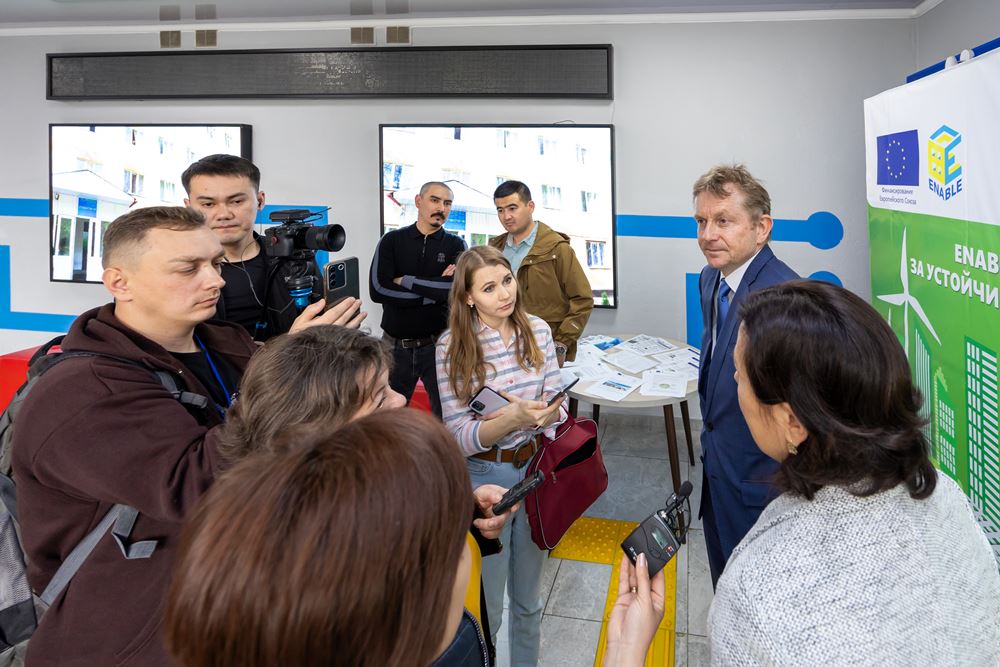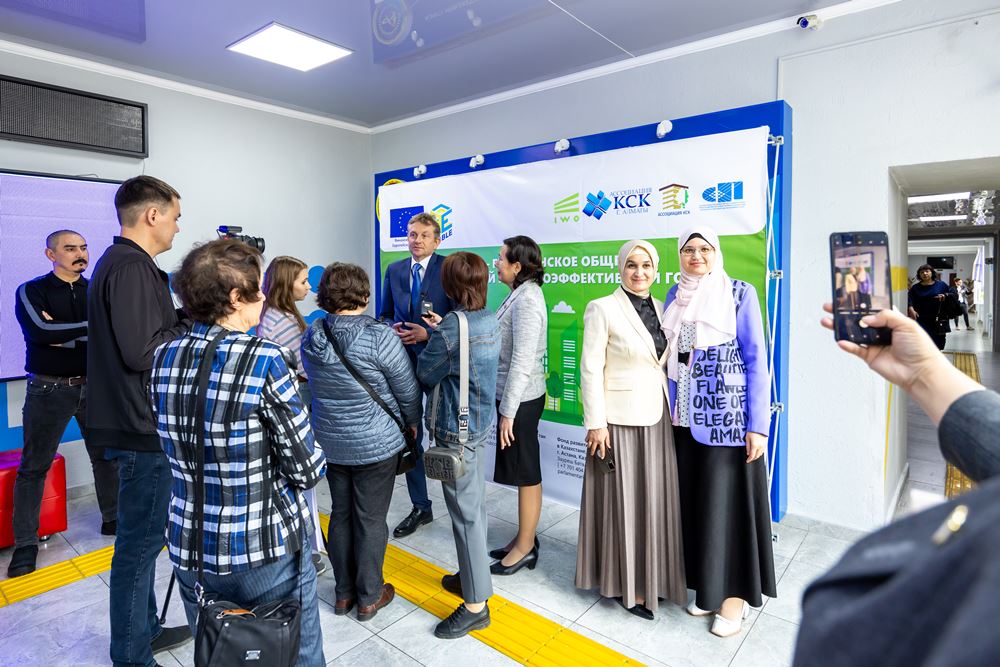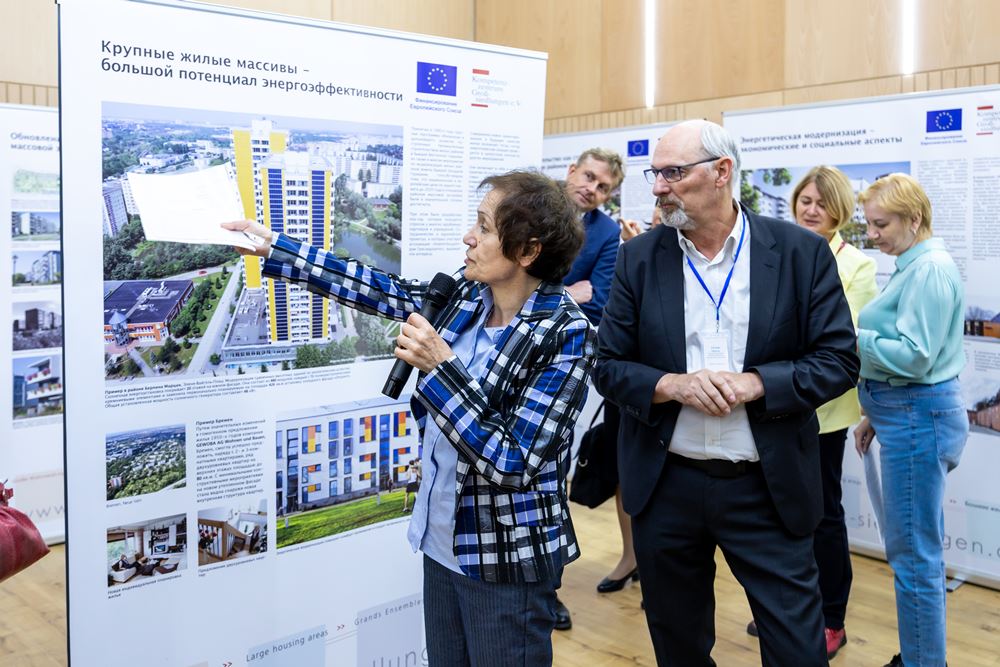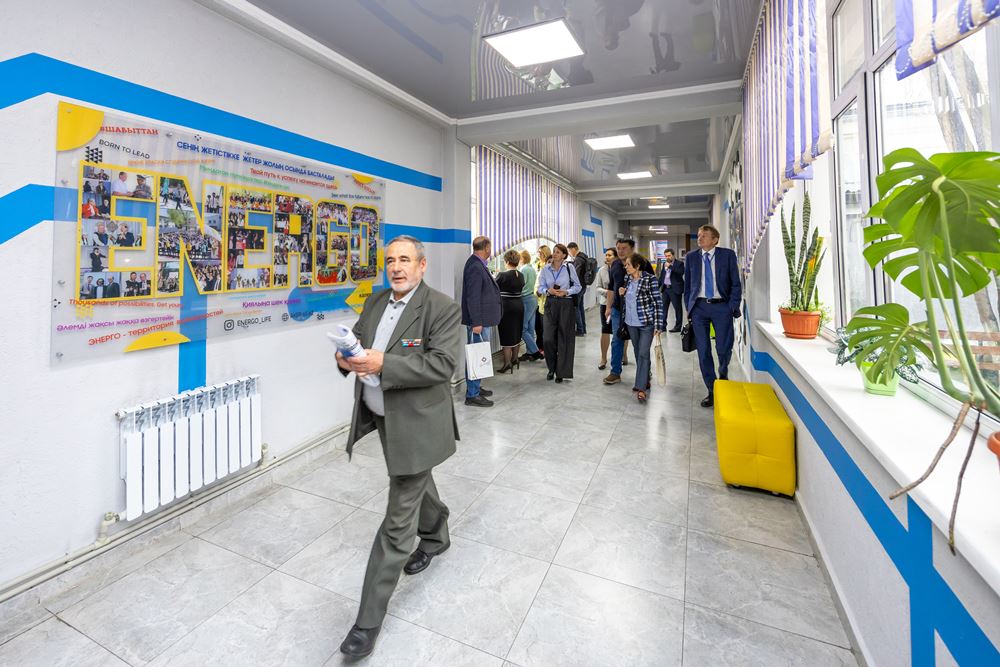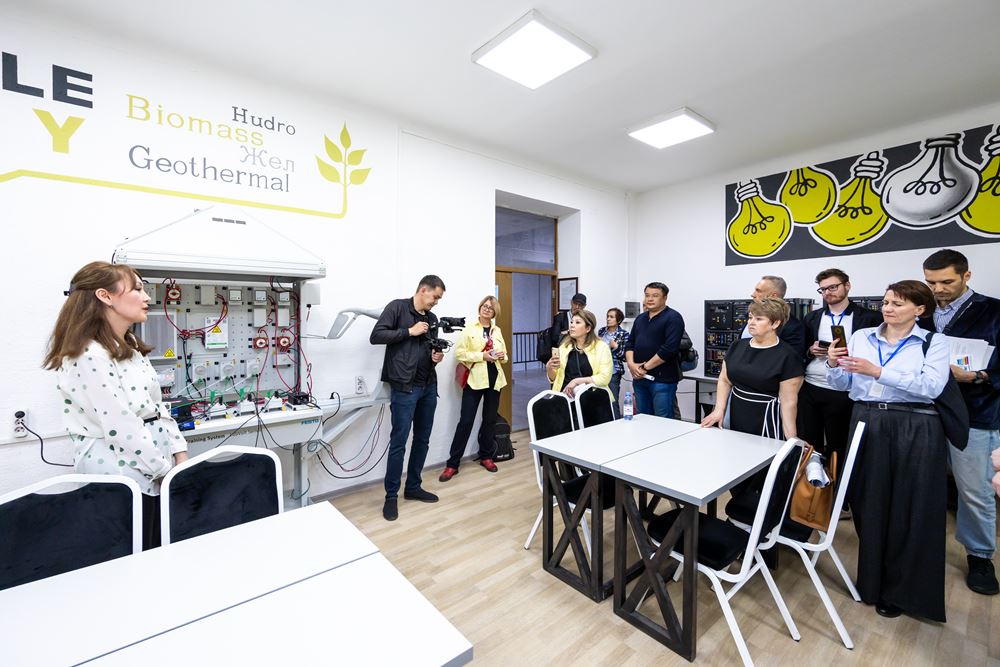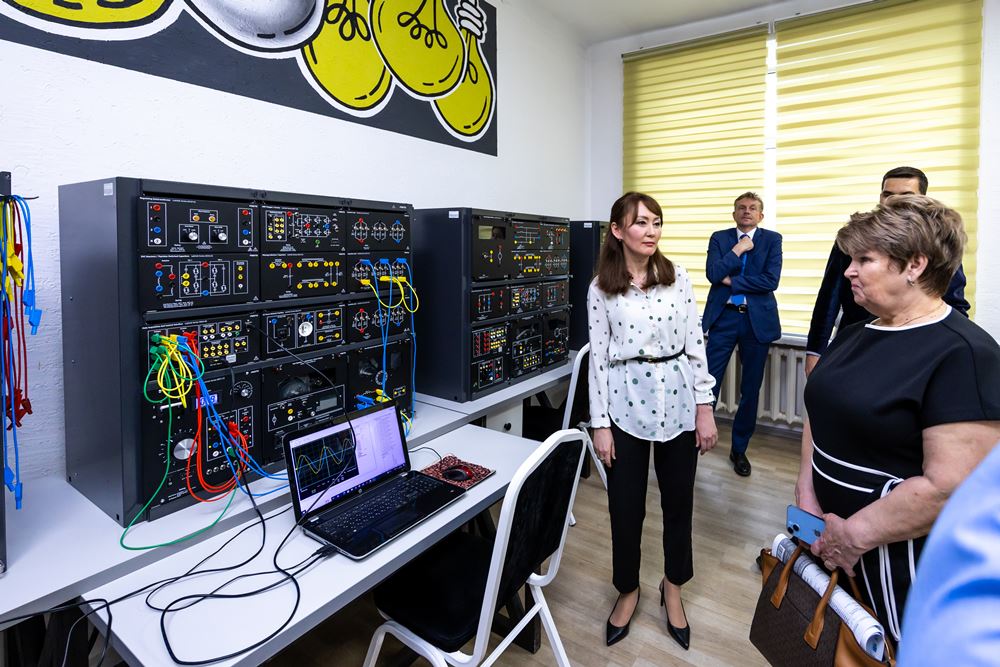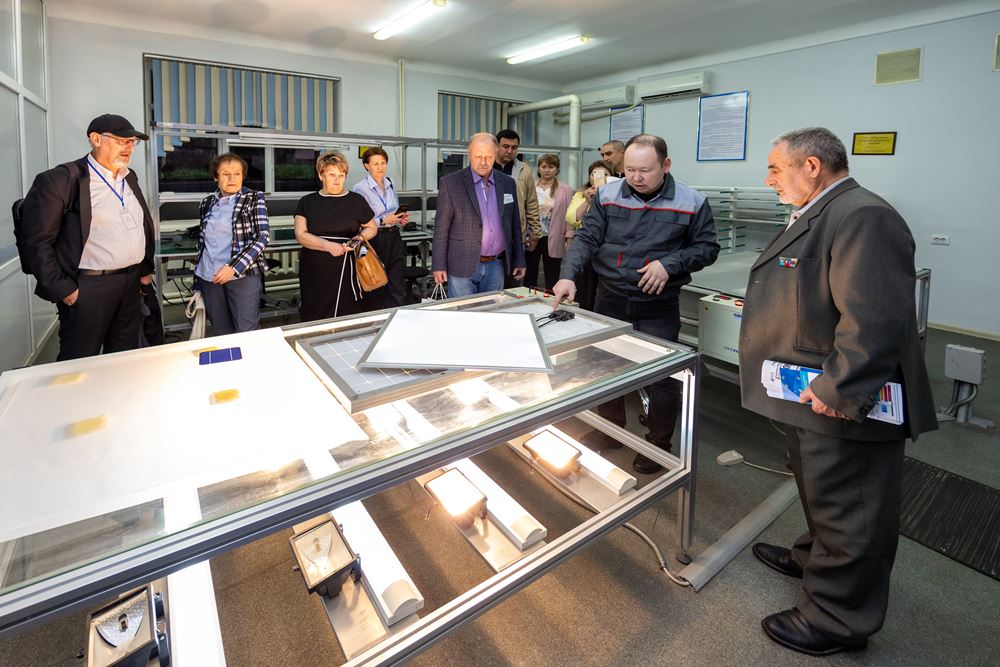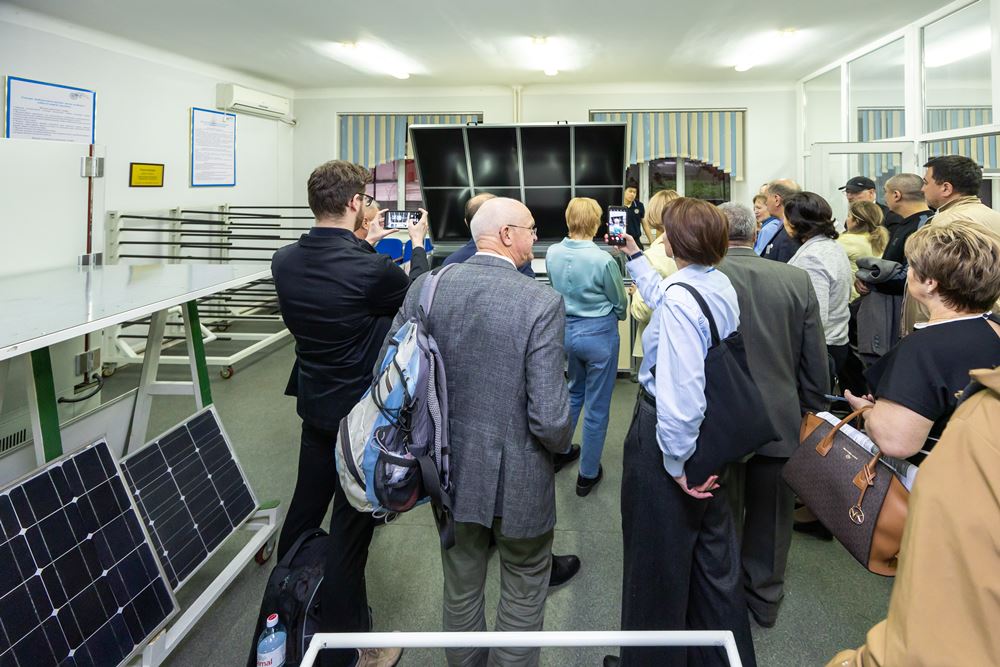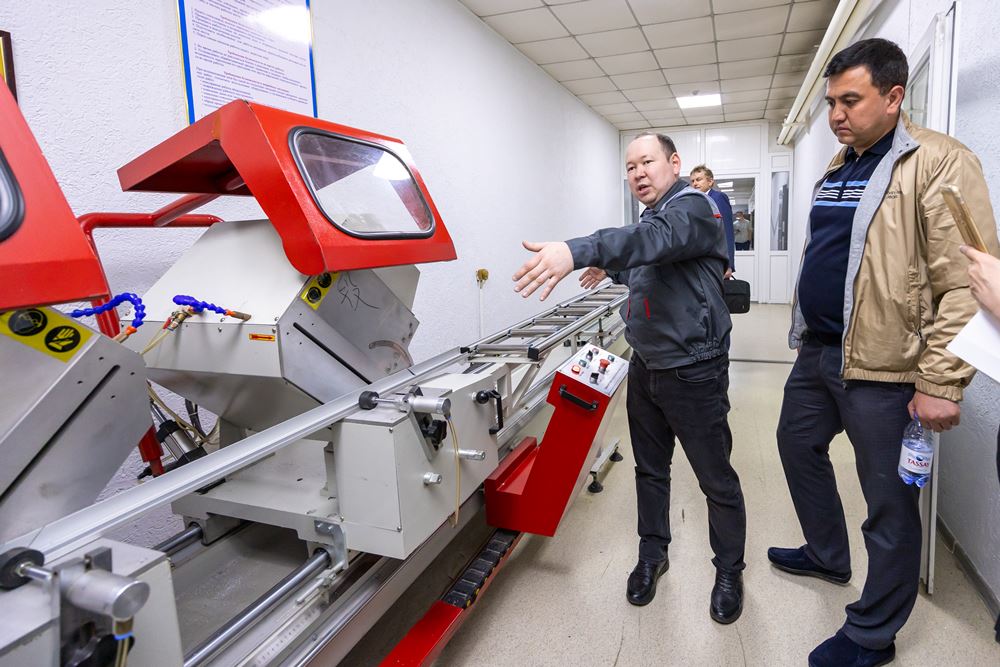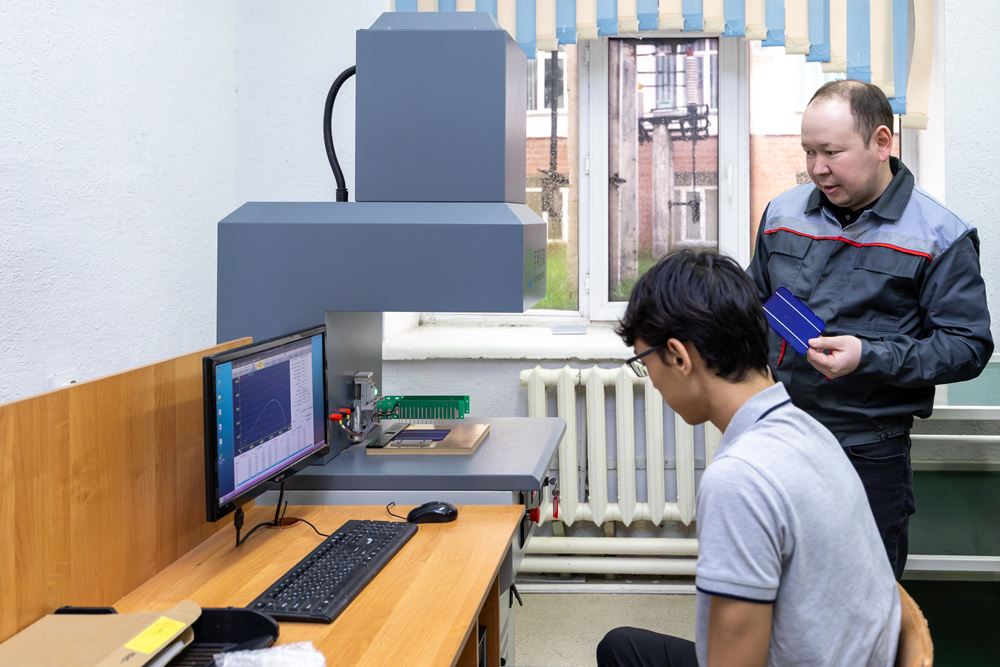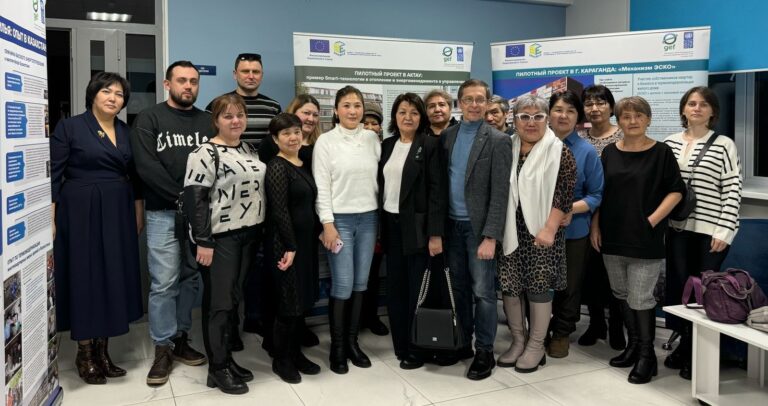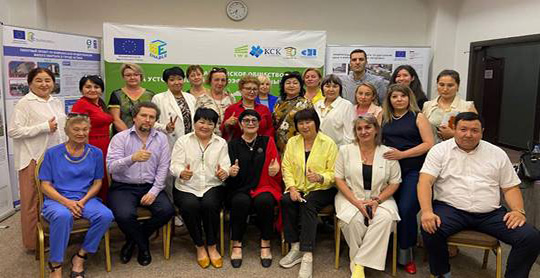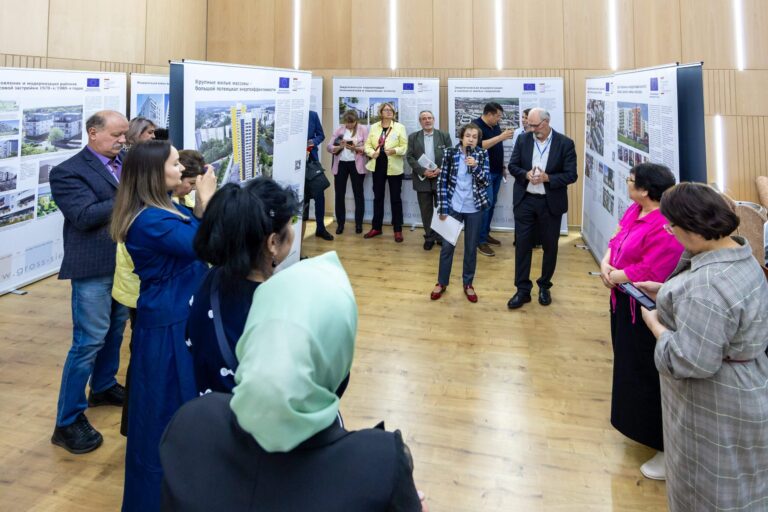Открытие проекта Европейского Союза «ENABLE – Гражданское общество за устойчивый и энергоэффективный город» (RU•EN)
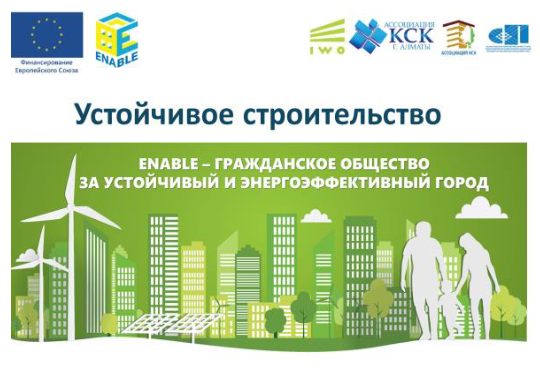
Энергоэффективность и гражданское общество взаимосвязаны: энергоэффективные меры требуют активного участия общества для их успешной реализации, а гражданское общество получает пользу от улучшения энергоэффективности в форме экономии ресурсов, улучшения качества жизни и снижения негативного воздействия на окружающую среду.
9 апреля 2024 года в Алматинском государственном колледже энергетики и электронных технологий (АГКЭиЭТ), состоялось открытие проекта ENABLE финансируемого Европейским Союзом, направленный на повышение участия организаций гражданского общества в принятии решений в жилищном секторе, особенно в области энергоэффективной реновации жилого фонда, на увеличение знаний и навыков организаций гражданского общества в области энергоэффективной реновации, с целью улучшения участия в принятии решений в жилищном секторе.
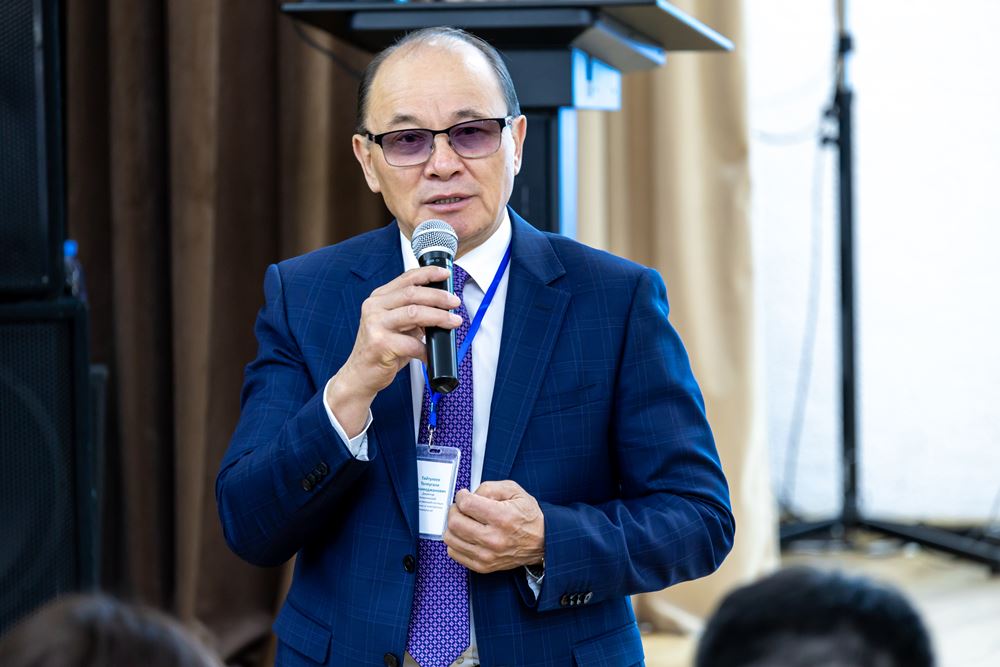
С приветственным словом выступил директор Алматинского государственного колледжа энергетики и электронных технологий – Тайтулеев Т.М., который поздравил коллег и партнеров проекта с открытием и отметил важность темы мероприятия, проводимых в рамках этого проекта, пожелал успешной деятельности, а также выразил готовность взаимовыгодно сотрудничать.
Председатель Комитета промышленности Министерства промышленности и строительства РК Азамат Панбаев, поздравил партнеров и участников мероприятия с запуском нового проекта ENABLE и выразил свою благодарность Инициативе «Жилищное хозяйство в Восточной Европе» (ИВО) взявших шефство над проектом. Он отметил, что потребность в энергетических ресурсах только растет и бережное отношение к нему важно. За последние 10 лет по данным Международного энергетического агентства, мировое потребление энергетических ресурсов возросло на 11%. Между тем, потребление электроэнергии и газа жилыми помещениями возросло на 30 и 20% соответственно.
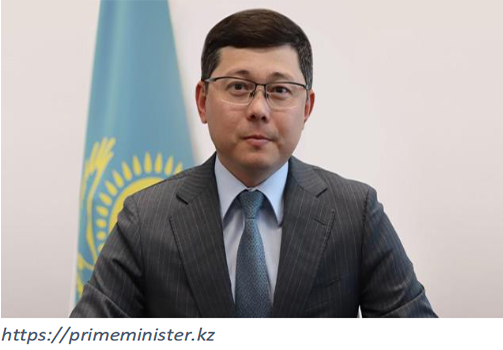
«По итогам 2022 года сектор зданий потребил в 1,5 раза больше энергоресурсов, чем в 2019 году, опередив промышленный сектор. И мы понимаем, что состояние зданий https://primeminister.kz влияет на уровень потребления. На сегодняшний день в Казахстане насчитывается более 57 000 многоквартирных жилых домов, в том числе 18 000 зданий нуждаются в модернизации по энергоэффетивности» — отметил Азамат Панбаев.
«В целях обеспечения энергоэффективности зданий Министерством совместно с депутатским корпусом прорабатываются новые подходы, такие введение инструмента постпроектного анализа для вновь вводимых зданий, устранение законодательных барьеров для заключения энергосервисных контрактов на объектах социальной инфраструктуры, организация прозрачности при учете потребления энергоресурсов» — продолжил он и добавил, что местные исполнительные органы проводят капитальный ремонт и санацию зданий, но тем не менее важна роль самого гражданского общества вовлеченных к стремлению за устойчивые и энергоэффективные города.
Европейский Союз играет ключевую роль в содействии энергоэффективности через законодательство, финансовую поддержку, образование и международное сотрудничество, что способствует достижению его целей по сокращению энергопотребления, снижению выбросов парниковых газов и улучшению качества жизни граждан.
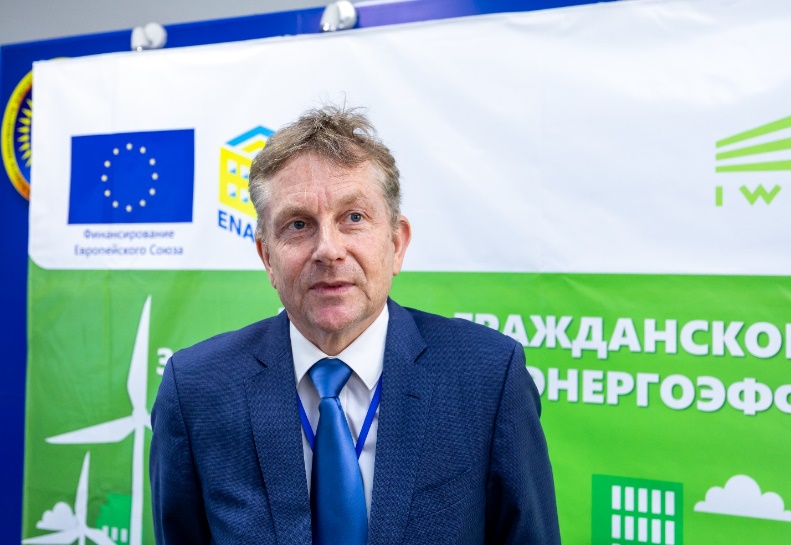
В этой связи с приветственной речью выступил Глава по сотрудничеству в Представительстве Европейского Союза в Казахстане, господин Йоханнес Баур.
В ходе конференции он подчеркнул, что сотрудничество между ЕС и Казахстаном в области торговли, экономики, и охраны окружающей среды продолжается уже более 30 лет. «И запуск проекта «ENABLE – Гражданское общество за устойчивый и энергоэффективный город» – имеет важное значение и направлен на содействие зеленому энергетическому переходу и получил грант на сумму 400 000 евро от ЕС в результате прошлогоднего конкурса в рамках нашей тематической программы «Организации гражданского общества»» — сказал он.
Также он отметил, что проект «ENABLE» соответствует амбициозному плану Казахстана
по достижению углеродной нейтральности к 2060 году и поддерживает усилия по реализации Соглашения о расширенном партнерстве и сотрудничестве. В рамках проекта будет акцентировано внимание на повышении энергоэффективности зданий в Казахстане.
Европейский Союз стремится сократить конечное энергопотребление на 11,7% к 2030 году, что позволит снизить счета за электричество и отопление, улучшить качество жизни и снизить зависимость от нефти и газа. Проект также предоставит Казахстану опыт ЕС по энергоэффективной модернизации жилых домов.
Отмечено, что жилье – не просто товар, а основная потребность, и решение проблем в жилищном секторе является приоритетом для правительства. В рамках проекта будет содействоваться разработке правильной политики и законодательства с участием гражданского общества, что существенно влияет на благополучие и стабильность общества. Европейский Союз подчеркнул готовность делиться своим опытом и ресурсами с Казахстаном в стремлении к устойчивому развитию.
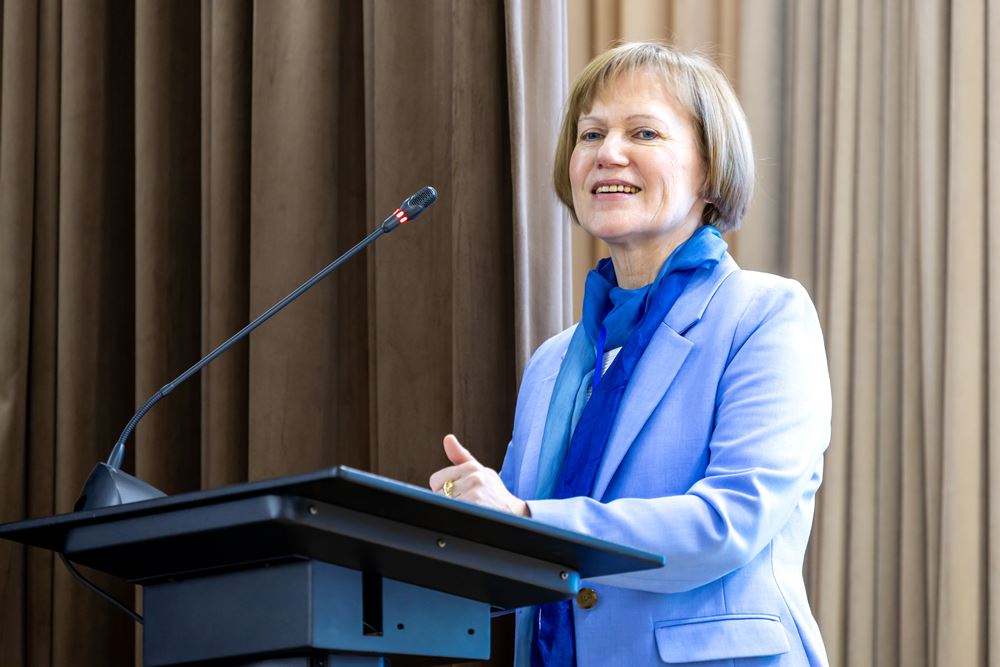
Руководитель проекта ENABLE, Инициатива «Жилищное хозяйство в Восточной Европе» (ИВО), г. Берлин, Германия, Лариса Шреккенбах, рассказал об основных целях и задачах проекта, которые заключаются в укрепление потенциала организаций гражданского общества (ОГО) для расширения их участия в принятии решений по поддержке развития устойчивого жилищного хозяйства c акцентом на энергоэффективность зданий.
Также раскрыла понимание того, что такое устойчивое строительство, т.е. это здания, ориентированные на будущее, которые должны строиться и эксплуатироваться без ущерба климату, с учетом экономической целесообразности, обеспечивать собственникам здоровую и комфортную среду.
Руководитель проекта отметила, что, энергоэффективность и климатическая нейтральность, сохранение биоразнообразия, сохранение ресурсов и использование возобновляемого сырья (ресайклинг), сокращение потребления земельных территорий, соблюдение прав человека в цепочке закупки и поставок товаров и услуг, а также обеспечение здоровья и комфорта пользователей и являются комплексными требованиями к устойчивому строительству.
Партнерами проекта этого важного проекта с казахстанской стороны являются: Ассоциация КСК г. Алматы, Петропавловская ассоциация КСК и Фонд Парламентаризма в Республике Казахстан.
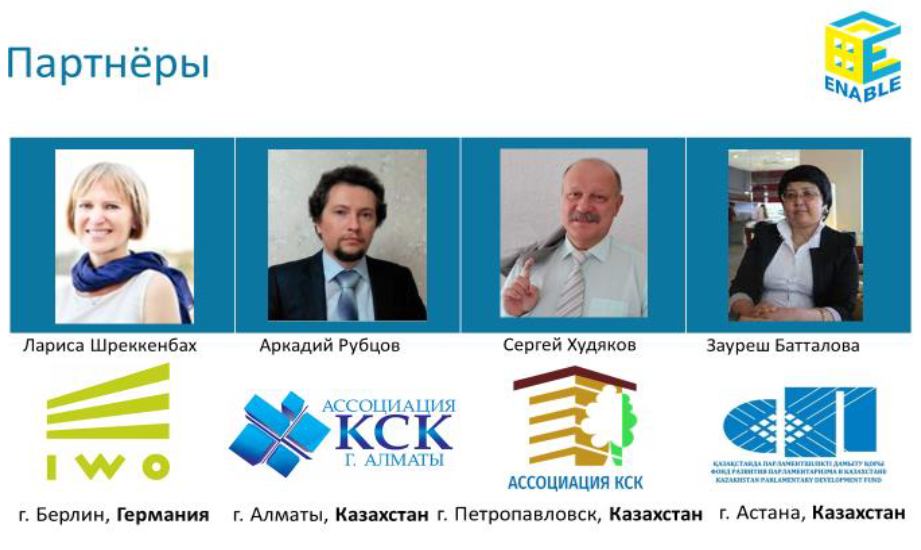
Анализ и опыт Германии показывает, что есть несколько способов для успешного строительства в жилых районах. И эти факторы работают независимо от того, какой тип нового строительства выбран (надстройка, пристройка расширение здания или отдельно стоящее здание).
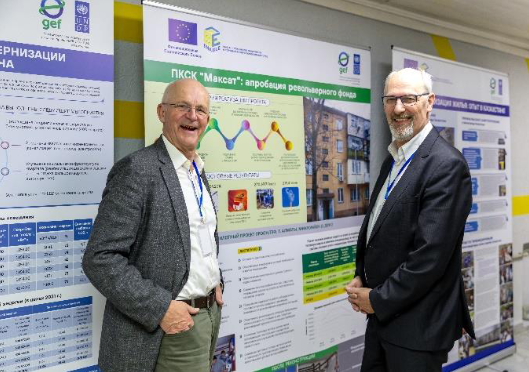
Руководитель Ассоциации «Центр компетенции крупных жилых массивов», г. Берлин, Германия, Ральф Протц и председатель правления Ассоциации Бернд Хунгер, предоставили информацию о том, как планируют в крупных жилых массивах модернизацию и новое строительство с учетом аспектов устойчивого развития.
Эксперты отметили, что в Берлине имеется около 1,9 млн квартир, где проживает примерно 3,5 млн человек. Из них:410 000 квартир расположены в районах массовой застройки, что составляет примерно 22%. Восточный Берлин включает 273 000 квартир, построенных в рамках индустриального строительства, что составляет 50% от общего числа квартир в этой части города. Каждый второй житель восточной части города проживает в квартире, построенной в рамках индустриального строительства.
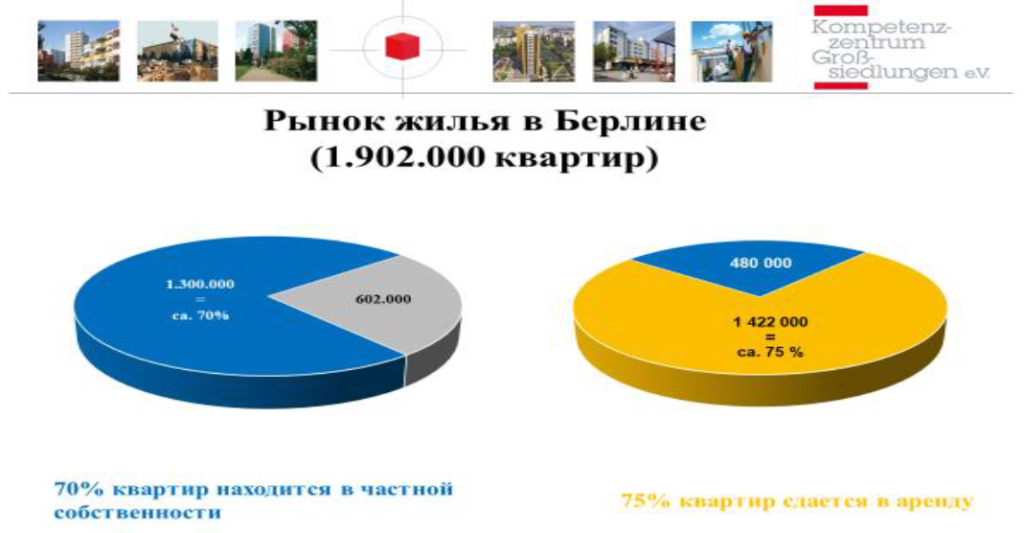
Важный фактор, что членами Ассоциации «Центра компетенции крупных жилых массивов» являются- жилищные компании и кооперативы, университеты, союз организаций в жилищной сфере, сервисные организации, города и общины, архитекторы, планировщики, инженеры, надрегиональные союзы и учреждения, агентства санации и частные лица. Объединяя свои компетенции и знания, они решают очень много важных вопросов в управлении жильем и принимают значимые решения в градостроительном развитии территорий, энергетической модернизации и защите климата, управляют процессами менеджмента, при этом учитывается мнение и участие самих жителей.
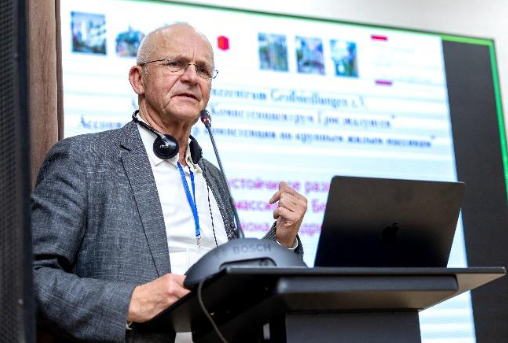
Председатель правления Ассоциации Бернд Хунгер, отметил, критерии оценивания при
дальнейшем развитии крупных жилых комплексов в Берлине, градостроительного анализа, т.е. пространственной структуры жилой застройки, социальной и транспортной инфраструктуры и многое другое. Вместе с тем необходимо учитывать демографический анализ и оценку жилищных условий населения, также как и стратегию обновления существующего жилищного фонда, определение мест нового жилого строительства, планы развития инфраструктуры, концепции обновления общественных пространств и зеленых насаждений. Они его называют мастер-план развития района.
Что примечательно, то, что также как и у нас в СНГ, были так называемые «хрущевки», которые представляли из себя линейную застройку, 4-5 этажей, множеством зелени, которые в последствии подвергались модернизации с учетом мнения жителей в том числе. На окраинах городов при жилых домах предусматривались гаражи.
Как любят говорить коллеги из Германии, «только богатые люди (страны) могут позволить себе дома в плохом состоянии! Мы слишком бедны, чтобы тратить дорогую энергию».
Резюмируя, можно сказать, что мастер-план города – это своего рода дорожная карта, определяющая стратегическое направление развития населенных пунктов. В нем согласовываются все секторальные решения, затрагивающие инфраструктуру, зонирование, экологию, и многие другие аспекты городской жизни. Однако мастер-план не ограничивается лишь техническими аспектами. Его разработка и утверждение – процесс, который активно вовлекает жителей города. Организуемые общественные слушания и консультации предоставляют возможность каждому жителю выразить свое мнение, внести предложения и участвовать в формировании будущего своего города. Одобрение мастер-плана становится важным политическим решением, принятым депутатами или другими органами управления. Это гарантирует, что развитие города исходит от представителей общества и отвечает интересам всех его жителей.
Особое внимание уделяется тому, чтобы мастер-план не оставался просто
декларацией намерений, но был включен в практическую деятельность. При разработке
конкретных планов строительства зданий, реконструкции объектов или создания новых
инфраструктурных систем необходимо строго соблюдать указания мастер-плана и
учитывать его решения о развитии района. Только так можно обеспечить согласованность
и гармонию в развитии городской среды, удовлетворяя потребности сегодняшних и
будущих поколений жителей.
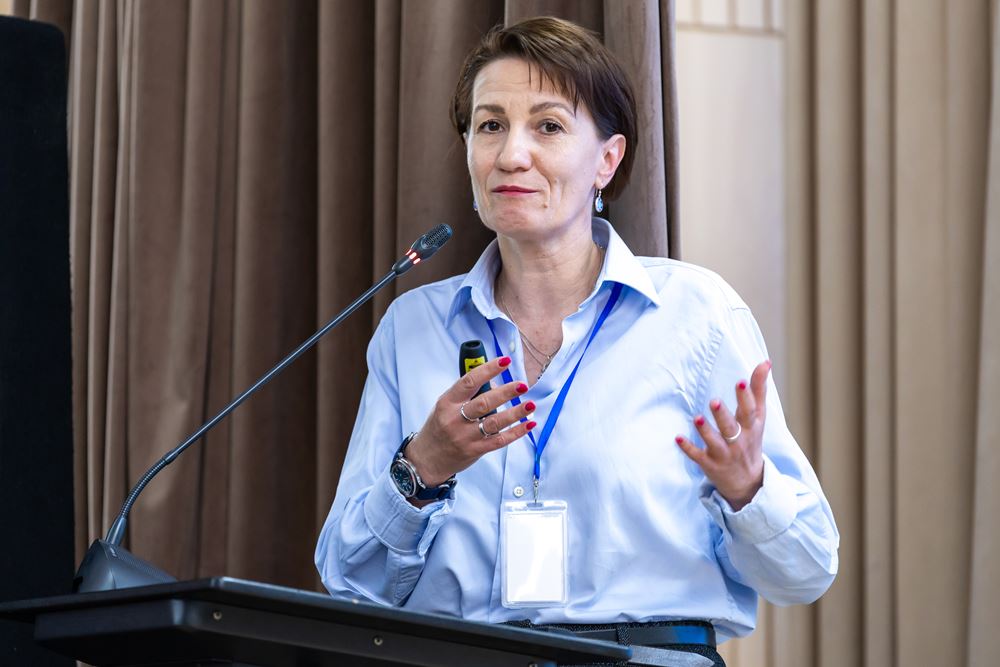
Светлана Харитонова, менеджер проектов Общественное объединение Карагандинский областной Экологический Музей, Экологическое общество «Зеленое спасение». В своем выступлении предоставила информацию о проблемах урбанизации, которые говорят о перенаселенности, социальном неравенстве, нехватке адекватного жилья, деградации инфраструктуры,
нерациональном использовании энергоресурсов, увеличении бытовых отходов. Однако концепция устойчивого города предлагает решения, где люди живут с минимальным воздействием на окружающую среду, где инфраструктура обеспечивает благополучие и сохранение ресурсов для будущих поколений. Поэтому, наше общество совместно с государственными органами должны осознано подходить к теме преобразования наших городов в места, где будет комфортная жизнь для всех нас.
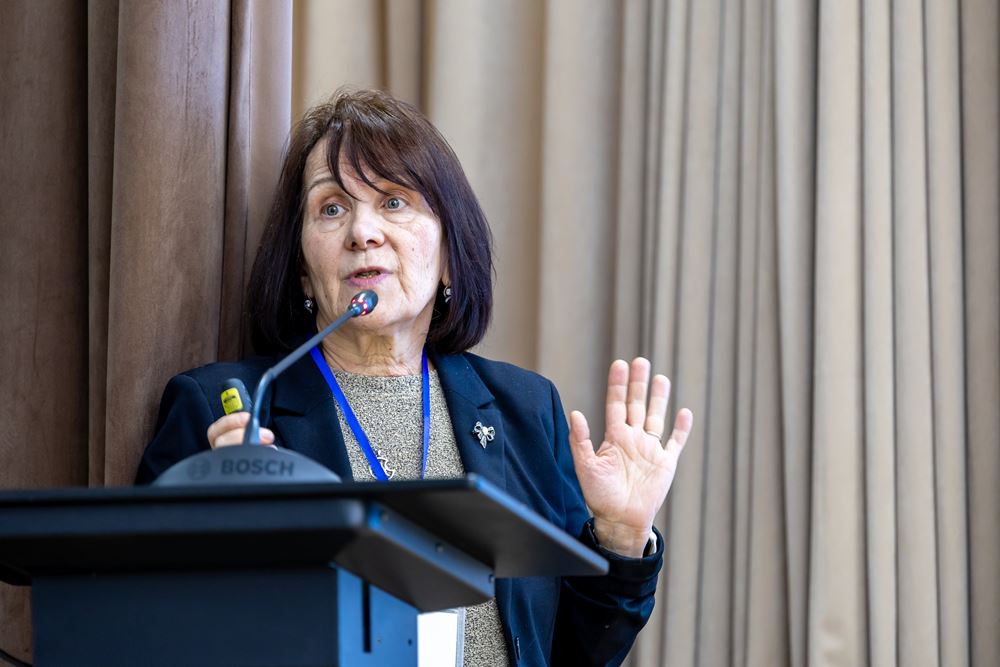
О важности управления отходами в развитии устойчивости городов, и стратегических целях Казахстана в этом направлении рассказала исполнительный директор Центр «Содействие устойчивому развитию» — Вера Мустафина.
В современном мире проблема обращения с отходами становится все более острой и актуальной. Неправильное управление отходами имеет глубокое воздействие на окружающую среду и приводит к серьезным экологическим проблемам. Открытое захоронение отходов, несанкционированное сжигание и недостаточная переработка приводят к выбросу парниковых газов, таких как CO2 и CH4, что усиливает изменение климата.
Для решения этих проблем необходимо принятие срочных мер, направленных на совершенствование системы обращения с отходами. Это включает в себя разработку и внедрение инновационных технологий для эффективной переработки и утилизации отходов, а также проведение образовательных кампаний с целью повышения осведомленности населения о влиянии неправильного обращения с отходами на здоровье и окружающую среду.
Правильное управление отходами не только способствует сохранению экологической устойчивости, но и обеспечивает здоровое и безопасное окружающее пространство для будущих поколений.
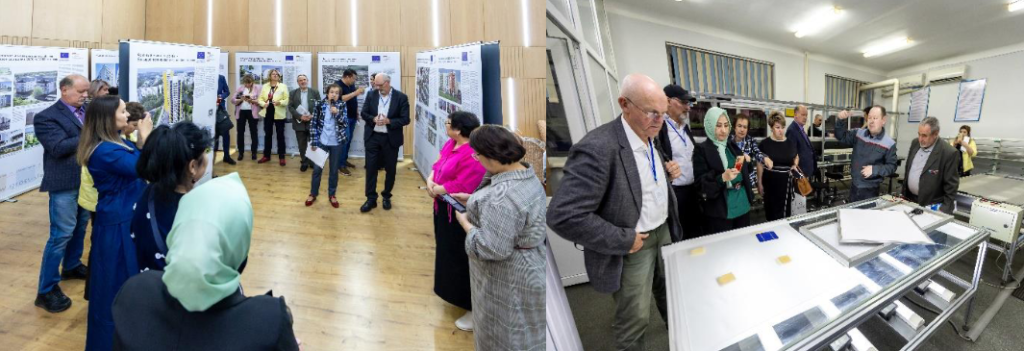
По завершении конференции участники посетили выставку, где ознакомились с международным опытом в области энергосбережения и модернизации жилищного фонда, представленным Германией, а также посмотрели проведенную работу в Казахстане. Также посетили лабораторию альтернативной энергетики колледжа, где были продемонстрированы процесс сбора самими учащимися энергосберегающих солнечных панелей.
С материалами проекта можно ознакомиться на сайте https://enablepro.kz/novosti/
Резюмируя, можно сказать, что энергоэффективность становится реальностью благодаря усилиям гражданского общества, которые вносят свой вклад в развитие устойчивых городов и создание экологически чистой среды для будущих поколений.
Выражаем благодарность всем участникам мероприятия, руководителям управляющих, сервисных и биллинговых компаниий, журналистам СМИ и телевидения, отдельная благодарность коллегам из Ассоциации профессиональных управляющих и обслуживающих жилищный фонд организаций Узбекистана.
Главный редактор
Алия Богаева
Launch of the European Union project «ENABLE — Civil Society for Sustainable and Energy Efficient City»

Energy efficiency and civil society are interlinked: energy efficiency measures require active participation of society for their successful implementation, and civil society benefits from energy efficiency improvements in the form of resource savings, improved quality of life and reduced negative environmental impacts.
On the 9th of April 2024, the Almaty State College of Energy and Electronic Technologies inaugurated the project ENABLE funded by the European Union, aimed at increasing the participation of civil society organisations in decision-making in the housing sector, especially in the field of energy-efficient renovation of housing stock, to increase the knowledge and skills of civil society organisations in the field of energy-efficient renovation, in order to improve participation in decision-making in the housing sector.

Toleugali Taituleyev, Director, Almaty State College of Energy and Electronic Technologies
© KSC Association Almaty
The welcoming speech was made by the Director of Almaty State College of Power Engineering and Electronic Technologies — T.M. Taituleyev, who congratulated colleagues and partners of the project on opening and noted the importance of the event’s topic and activities carried out within the framework of this project, wished successful work, and expressed willingness to mutually beneficial co-operation.
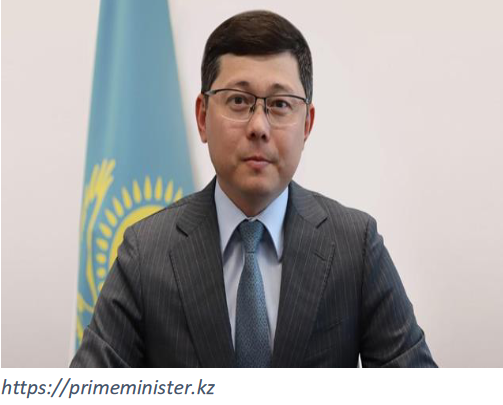
Azamat Panbaev, Chairman of the Industry Committee of the Ministry of Industry and Construction of the Republic of Kazakhstan
© Official Information Resource of the Prime Minister of the Republic of Kazakhstan
Chairman of the Industry Committee of the Ministry of Industry and Construction of the Republic of Kazakhstan Azamat Panbaev congratulated the partners and participants of the event on the launch of the new ENABLE project and expressed his gratitude to the Housing Initiative for Eastern Europe (IWO e. V.) coordinating the project. He noted that the need for energy resources is only growing and therefore energy efficient modernisation of the housing stock is important. Over the past 10 years, according to the International Energy Agency, the world consumption of energy resources has increased by 11 %. Meanwhile, electricity and gas consumption in residential buildings has increased by 30 % and 20 % respectively.
«At the end of 2022, the buildings sector consumed 1.5 times more energy than in 2019, ahead of the industrial sector. And we realise that the condition of buildings affects the level of consumption. Today, there are more than 57,000 residential apartment buildings in Kazakhstan, including 18,000 buildings in need of energy efficiency modernisation» — said Azamat Panbaev. «In order to ensure energy efficiency of buildings, the Ministry together with the parliamentary body is working on new approaches, such as introduction of a post-project analysis tool for newly commissioned buildings, elimination of legislative barriers to the conclusion of energy service contracts for social infrastructure facilities, organisation of transparency in accounting for energy consumption,» he continued and added that local executive bodies carry out major repairs and rehabilitation of buildings, but nevertheless the role of civil society itself is important in the development of the energy efficiency ofbuildings.

Johannes Baur, Head of Cooperation, EU Delegation to Kazakhstan
© KSC Association Almaty
The European Union plays a key role in promoting energy efficiency through legislation, financial support, education and international co-operation, which contributes to its goals of reducing energy consumption, lowering greenhouse gas emissions and improving the quality of life of citizens.
In this regard, Mr Johannes Baur, Head of the Cooperation, EU Delegation to Kazakhstan, made a welcoming speech.
During the conference, he emphasised that cooperation between the EU and Kazakhstan in the fields of trade, economy, and environmental protection has been going on for more than 30 years. «And the launch of the ENABLE project — Civil Society for Sustainable and Energy Efficient Cities — is important and aims to promote a green energy transition and has received a €400,000 grant from the EU as a result of last year’s call for proposals under our Civil Society Organisations thematic programme,» he said.
He also noted that the ENABLE project is in line with Kazakhstan’s ambitious plan to achieve carbon neutrality by 2060 and supports efforts to implement the Enhanced Partnership and Cooperation Agreement. The project will emphasise improving the energy efficiency of buildings in Kazakhstan.
The European Union aims to reduce final energy consumption by 11.7 % by 2030, which will reduce electricity and heating bills, improve quality of life and reduce dependence on oil and gas. The project will also provide Kazakhstan with EU experience in energy efficient modernisation of residential buildings. It is noted that housing is not just a commodity but a basic need and addressing problems in the housing sector is a priority for the government. The project will promote the development of good policies and legislation with the participation of civil society, which has a significant impact on the well-being and stability of society. The European Union emphasised its readiness to share its experience and resources with Kazakhstan in pursuit of sustainable development.

Larissa Schreckenbach, Project Director, Housing Initiative for Eastern Europe (IWO e. V.), Berlin, Germany
© KSC Association Almaty
Larissa Schreckenbach, Project Director, Housing Initiative for Eastern Europe (IWO e. V.), Berlin, Germany, Berlin, Germany, spoke about the main goals and objectives of the project, which are: to strengthen the capacity of civil society organisations (CSOs), to increase their participation in decision-making to support the development of sustainable housing with a focus on energy efficiency of buildings. She also revealed the understanding of what sustainable building is, i.e. future-oriented buildings that should be built and operated in a climate-friendly and economically viable way, providing owners with healthy and comfortable environment. The project director pointed out that energy efficiency and climate neutrality, biodiversity conservation, resource conservation and use of renewable raw materials (recycling), reduction of land consumption, respect for human rights in the procurement and supply chain of goods and services, as well as ensuring the health and comfort of the users are the integrated requirements for sustainable construction. The project partners of this important project from the Kazakhstan side are: Almaty City Association of Apartment Owners’ Cooperatives (ALMATY ASSOCIATION), Petropavlovsk Association of Apartment Owners’ Cooperatives (PETROPAVLOVSK ASSOCIATION) and Kazakhstan Parliamentary Development Fund (KPDF).
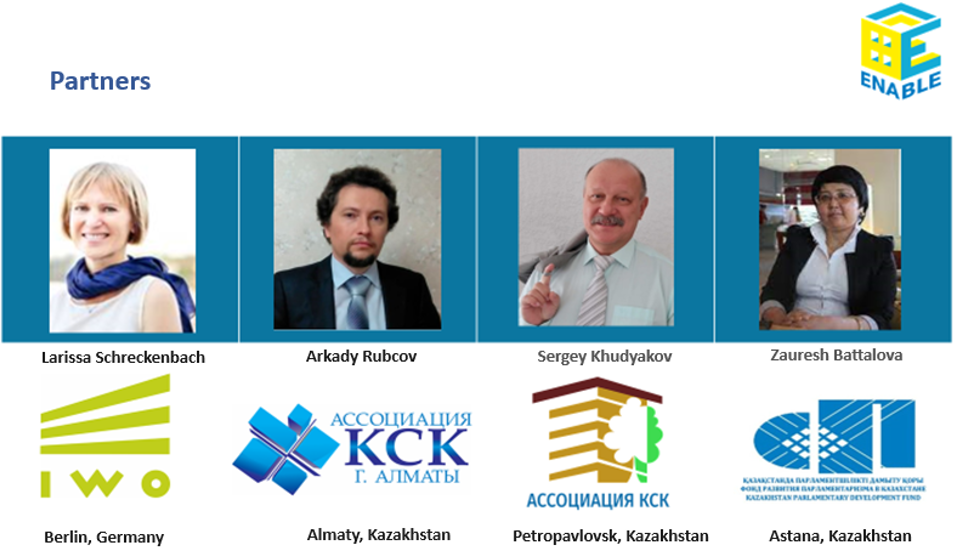

Ralf Protz, Expert of the Association «Competence Center for Large Residential Areas» and Bernd Hunger, Head of the Association «Competence Center for Large Residential Areas», Berlin, Germany © KSC Association Almaty
Analysis and experience in Germany show that there are several ways to build successfully in residential areas. And these factors work irrespective of which type of new construction is chosen (superstructure, building extension or freestanding building).
Ralf Protz, , Expert of the Association «Competence Center for Large Residential Areas» and Bernd Hunger, Head of the Association, provided information on how modernisation and new construction in large residential areas are planned with sustainability in mind. The experts noted that Berlin has around 1.9 million flats with approximately 3.5 million inhabitants. Of these, 410,000 flats are located in mass development areas, which is approximately 22 per cent. East Berlin includes 273,000 flats built as part of industrial construction, which is 50 per cent of the total number of flats in this part of the city. Every second resident of the eastern part of the city lives in a flat built as part of industrial construction.
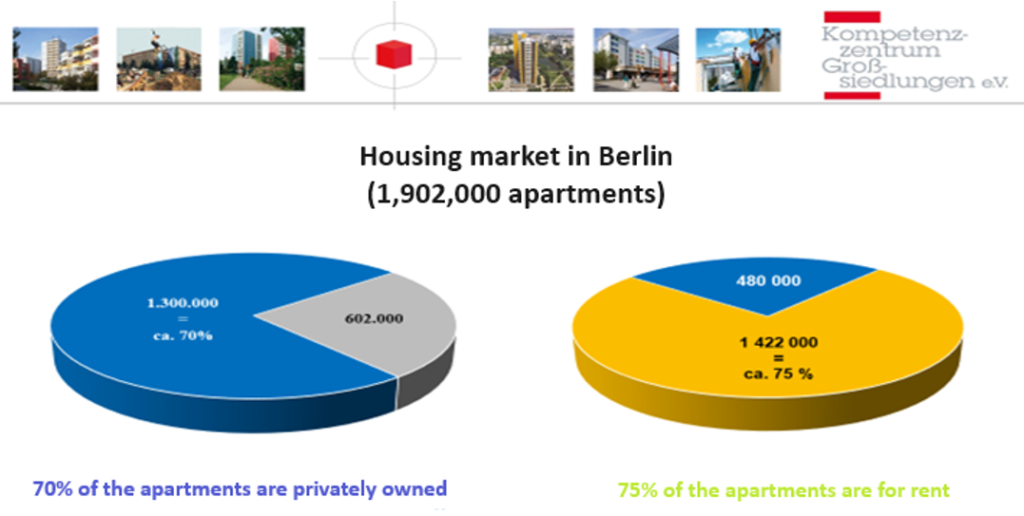
An important factor is that the members of the Association «Centre of Competence for Large Residential Areas» are housing companies and cooperatives, universities, alliances of organisations in the housing sector, service organisations, cities and communities, architects, planners, engineers, supra-regional associations and institutions, rehabilitation agencies and private individuals. By combining their competences and knowledge, they solve a great many important issues in housing management and make significant decisions in urban development of territories, energy modernisation and climate protection, manage management processes, while taking into account the opinion and participation of the inhabitants themselves.

Head of the Association «Competence Center for Large Residential Areas», Berlin, Germany © KSC Association Almaty
Bernd Hunger, Head of the Association «Competence Center for Large Residential Areas», pointed out the evaluation criteria for the further development of large residential complexes in Berlin, urban planning analysis, i.e. the spatial structure of residential development, social and transport infrastructure and much more. At the same time, demographic analysis and assessment of the housing conditions of the population must be taken into account, as well as a strategy for the renewal of the existing housing stock, identification of locations for new residential construction, infrastructure plans, concepts for the renewal of public spaces and green spaces. They call it a neighbourhood master plan.
What is particularly noteworthy is that, just as in our CIS countries, there were so-called «khrushchevkas», which were linear buildings, 4-5 floors high, with lots of greenery, which were subsequently modernised, taking into account the opinion of the residents. On the outskirts of cities, garages were provided in residential buildings.
As colleagues in Germany are fond of saying, «only rich people (of a country) can afford houses in bad condition! We are too poor to waste expensive energy»
To summarise, a city masterplan is a kind of roadmap that defines the strategic direction of community development. It harmonises all sectoral decisions affecting infrastructure, zoning, ecology, and many other aspects of urban life. However, a masterplan is not limited to technical aspects. Its development and approval are a process that actively involves the city’s residents. Organised public hearings and consultations provide an opportunity for each resident to express their opinion, make suggestions and participate in shaping the future of their city. The approval of the masterplan becomes an important political decision taken by deputies or other governing bodies. This ensures that the development of the city comes from the representatives of the community and is in the interests of all its residents. Particular attention is paid to ensuring that the masterplan does not remain a mere declaration of intentions but is incorporated into practical activities. When developing specific plans for the construction of buildings, the reconstruction of facilities or the creation of new infrastructure systems, it is necessary to strictly follow the guidelines of the masterplan and take into account its decisions on the development of the neighbourhood. This is the only way to ensure coherence and harmony in the development of the urban environment, meeting the needs of today’s and future generations of residents.

Svetlana Kharitonova, Project Manager, Public Association «Karaganda Regional Ecological Museum», Ecological Society «Green Salvation», Almaty, Kazakhstan© KSC Association Almaty
Svetlana Kharitonova, Project Manager, NGO «Karaganda Regional Ecological Museum», Ecological Society «Green Salvation», provided information about the problems of urbanisation in her presentation, which speak about overpopulation, social inequality, lack of adequate housing, degradation of infrastructure, irrational use of energy resources, increase in household waste. However, the concept of sustainable city offers solutions where people live with minimal environmental impact, where infrastructure ensures well-being and preservation of resources for future generations. Therefore, our society, together with the state authorities, should consciously approach the topic of transforming our cities into places where there will be a comfortable life for all of us.

Vera Mustafina, Executive Director, Centre for Sustainable Development Promotion, Almaty, Kazakhstan© KSC Association Almaty
Vera Mustafina, Executive Director of the Centre for Sustainable Development Promotion, spoke about the importance of waste management in the development of urban sustainability and Kazakhstan’s strategic goals in this direction.
In the modern world the problem of waste management is becoming more and more acute and urgent. Improper waste management has a profound impact on the environment and leads to serious environmental problems. Open dumping of waste, unauthorised incineration and insufficient recycling result in the emission of greenhouse gases such as CO2 and CH4, exacerbating climate change.
To address these problems, urgent action is required to improve the waste management system. This includes the development and introduction of innovative technologies for efficient waste treatment and utilisation, as well as educational campaigns to raise public awareness of the impact of improper waste management on health and the environment. Proper waste management not only contributes to environmental sustainability, but also ensures a healthy and safe environment for future generations.
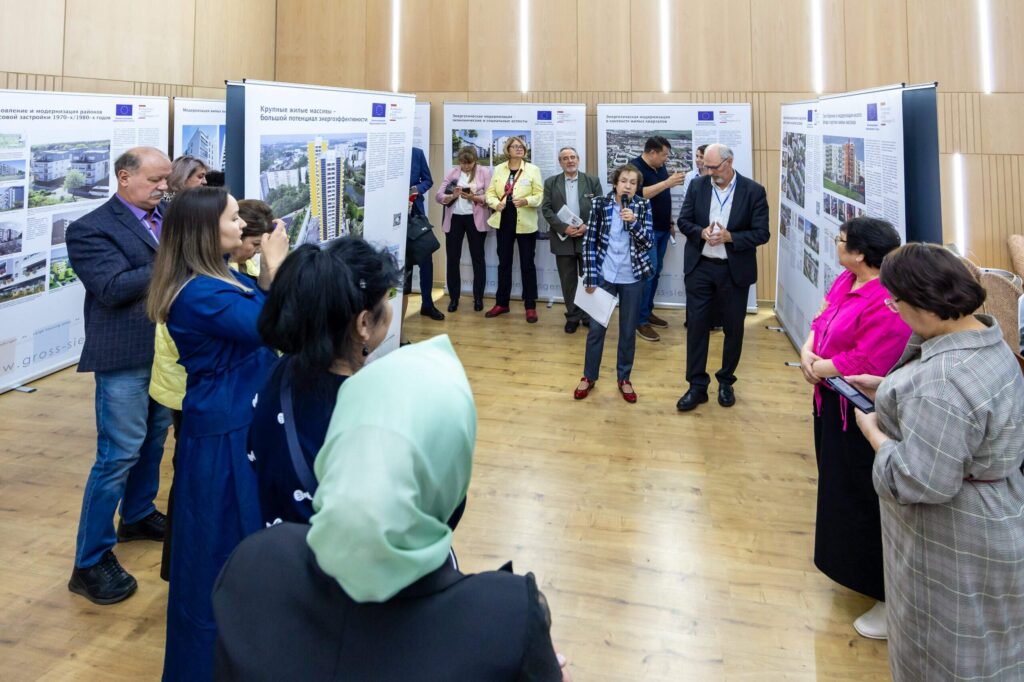
Exhibition «Development Prospects of Large Residential Areas — German Experience»
© KSC Association Almaty
At the end of the conference, the participants visited the exhibition, where they learnt about international experience in the field of energy saving and modernisation of housing stock, presented by Germany, and also saw the work done in Kazakhstan. They also visited the alternative energy laboratory of the college, where the process of collecting energy-saving solar panels by the students themselves was demonstrated.
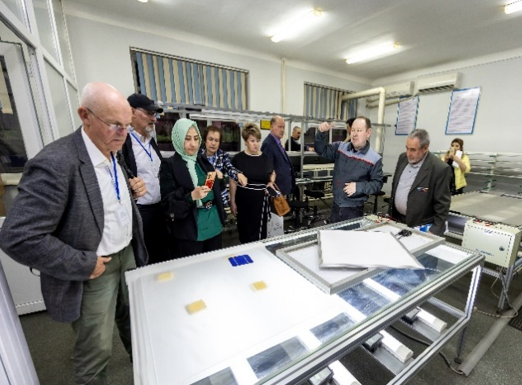
Excursion at the college
© KSC Association Almaty
The project materials are available at: https://enablepro.kz/novosti/
To summarise, energy efficiency is becoming a reality thanks to the efforts of civil society contributing to the development of sustainable cities and a cleaner environment for future generations.
We express our gratitude to all participants of the event, heads of management, service and billing companies, journalists of mass media and television, special thanks to colleagues from the Association of Professional Managers and Housing Services Organization – Association Uyushmasi, Uzbekistan.
Editor-in-Chief
Aliya Bogayeva
Запись прямого эфира 9 апреля 2024 г. Открытие проекта ENABLE — ГРАЖДАНСКОЕ ОБЩЕСТВО ЗА УСТОЙЧИВЫЙ И ЭНЕРГОЭФФЕКТИВНЫЙ ГОРОД
Смотрите также видео-презентацию открытия проекта ENABLE (перейти по ссылке).
